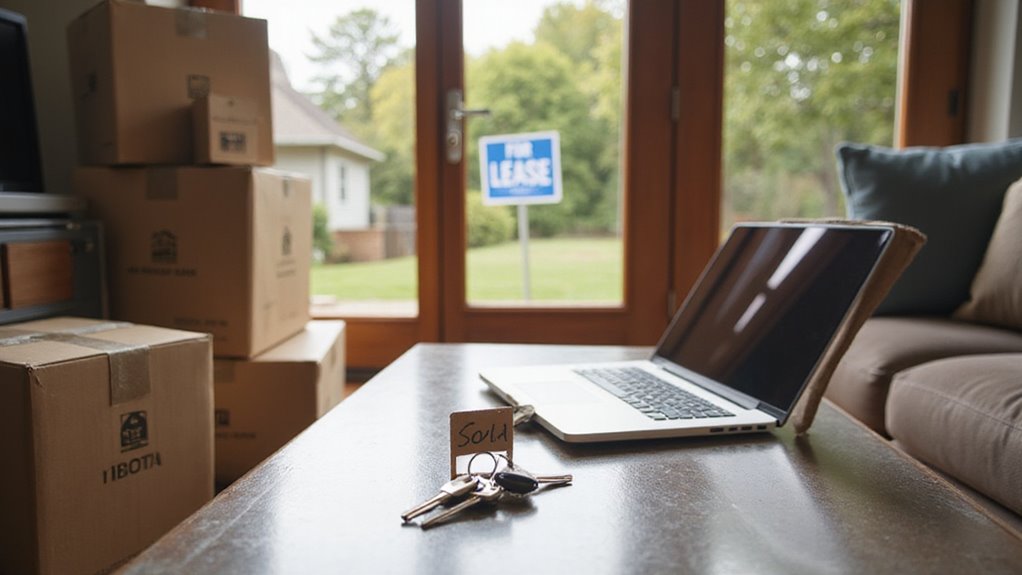Relocating can be stressful, especially when you still have a mortgage on your current home. You might wonder how to keep up with payments while managing a new place. It is important to know your options before making any moves.
If you ignore your mortgage, you could face late fees or even risk foreclosure. This can hurt your credit and make your move even harder. Uncertainty about your next steps adds to the pressure.
The best way to handle mortgage payments when relocating is to explore options with your lender and plan ahead. You can consider transferring your mortgage, refinancing, or renting out your home. Careful planning protects your finances and gives you peace of mind. This blog will guide you through these steps so you can relocate without mortgage worries.
Key Takeaways
- Consult your lender early to discuss mortgage options, payment adjustments, and any relocation-specific fees or requirements.
- Review your mortgage agreement for prepayment penalties, portability, or restrictions on renting the property during your absence.
- Consider refinancing or porting your mortgage if relocating to a new home and wanting to retain favorable loan terms.
- If renting out your home, ensure your mortgage allows it and set up reliable property management to maintain payments.
- Plan for potential vacancy periods by budgeting for continued mortgage payments until the home is sold or leased.
Assessing Your Current Mortgage Terms

Assessing your current mortgage terms means checking your loan details before making any decisions about your home. You should know if your mortgage is fixed or adjustable. Review your interest rate conditions and look for any prepayment penalties.
If you pay off your mortgage early, you might face extra fees. It is important to understand these costs before selling, renting, or transferring ownership. Knowing your equity helps you see your financial options. Checking for clear title issues can also help prevent unexpected legal problems during the sale or transfer process.
Significant home equity can help with a down payment on a new house. If interest rates have changed, refinancing or moving your mortgage may impact your finances. Always compare the benefits and drawbacks of each choice.
When reviewing your options, remember that mortgage liens are automatically put in place when borrowing from a bank, and understanding how they work can help you avoid surprises during relocation.
Communicating With Your Lender
You should talk to your lender before making any decisions about your mortgage during a move. If you have questions, ask your lender for clear answers. This helps you understand your payment options when relocating.
You can ask how moving might change your loan schedule or if there are fees for early payoff. If you plan to use home equity for a new down payment, tell your lender. Your lender may give you better advice if you share your timeline and financial plans. In some cases, understanding whether your property is held in joint tenancy or another form of ownership can inform how your mortgage will be handled during the relocation process.
If you take notes during your discussions, you will have useful records. Being open with your lender helps you avoid problems later. If you communicate clearly, you are more likely to understand all your mortgage requirements when moving. When discussing your plans, also mention if you’re considering selling your home to cash buyers, as this can affect your payoff process and timeline.
Exploring Mortgage Portability Options

If you’re considering porting your mortgage to a new home, start by confirming whether your current loan qualifies for portability. You’ll need to understand the exact steps your lender requires to transfer the mortgage, as the process can be complex. Make sure you also factor in any fees or penalties, since these can affect your overall moving costs. Remember that correctly pricing the home is essential—overpricing can delay your sale, potentially complicating your relocation timeline. It can also be helpful to set the right price for your current home before relocating, as this can streamline your sale and financial planning.
Eligibility for Porting Mortgages
You can sometimes take your current mortgage to a new home. This is called “porting” a mortgage. Not all mortgages allow this option.
Check your mortgage agreement to see if porting is possible. If allowed, you must meet your lender’s current approval rules. These rules may be different from when you first got your mortgage.
Strong credit, stable income, and low debt are important. If your mortgage has insurance, confirm with the insurer if it can transfer. Some insurers do not allow transfers to new homes.
Your new property must meet the lender’s requirements. Local laws may also affect your eligibility. Always talk to your lender or broker early in the process.
Process of Transferring Loans
Transferring your loan lets you move your mortgage to a new property. This process has several important steps you must follow. You need to contact your lender early and share your plans.
The lender will check details about your new home. They will review your finances and the property to see if you still qualify. If your financial situation or the new home’s value changes, the lender might change your loan terms.
You must give updated financial documents for the reassessment. Good communication with your lender helps avoid problems and delays. If you understand each step, moving your mortgage can be much easier.
Potential Costs and Penalties
Moving your mortgage to a new home can involve extra costs and penalties. Lenders often charge administrative fees or early repayment penalties. These costs can add up quickly.
If you break your fixed-term lease early, you may pay additional fees. Mortgage insurance might also cost more if your new loan changes. New premiums or re-qualification could be required.
Always check your lender’s rules on mortgage portability. If the penalties are high, moving your mortgage may not save you money. Careful review helps you make a smart choice.
Refinancing Your Home Loan

Refinancing your home loan can help you manage your mortgage when you move. This option allows you to get a new loan with better terms. You may lower your interest rate or use your home equity for extra cash.
If you find lower interest rates, you could reduce your monthly payment. Homeowners with enough equity might use it for moving costs or a new down payment. Some may switch from an adjustable-rate to a fixed-rate mortgage for stability. If your property is in less-than-ideal condition, as-is cash purchases can provide an alternative to refinancing by eliminating the need for costly repairs.
You can also change your loan period to match your new budget. Some people shorten their loan to pay off their home faster. Others extend it to lower their monthly payment.
If you have enough equity, you might remove private mortgage insurance. This can save you money over time. Always compare costs and savings before deciding to refinance. If you’re considering selling your current home, understanding the benefits of selling as-is can help you evaluate whether refinancing or a quick sale better fits your financial goals.
Renting Out Your Property
Renting out your property helps you manage your mortgage if you need to move. This option can turn your home into a source of income. It can also help cover your monthly loan payments.
Start by getting your property valued to set a fair rental price. If you check local rental rates, you can attract good tenants. A competitive price helps you avoid long vacancy periods. For an accurate rental estimate, consider using a real estate agent evaluator to thoroughly assess your property and its market potential.
Tenant screening is important if you want to avoid problems. You should check each applicant’s credit score, rental history, and references. Careful screening lowers the risk of late payments or property damage.
A clear lease agreement protects both you and your tenant. It should outline responsibilities and payment terms. If you set clear rules, you can prevent many issues later.
If you manage your rental well, you maintain steady cash flow. Good management also protects your investment while you are away. Renting can make your move easier and less stressful. Before renting, review your mortgage agreement for any rental restrictions that might affect your ability to lease the property.
Selling Your Home Before Relocating

When you’re preparing to move, selling your home at the right time becomes critical to managing both your finances and your stress. You’ll need to set a competitive price based on current market trends and work closely with your agent to coordinate closing dates that align with your relocation plans.
For homeowners in a hurry, considering a quick-closing cash buyer can streamline the selling process and potentially eliminate many of the delays and uncertainties of traditional sales. With careful planning, you can minimize gaps between selling your old home and settling into your new one. If your property has recently been inherited, understanding the step-up in basis can help you accurately determine any potential capital gains taxes when selling before your move.
Timing the Home Sale
Selling your home before you move helps you avoid paying for two places at once. Careful planning is needed so you do not end up without a place to live or with extra costs. You must time your sale to match your move.
If the local market is fast, your home may sell quickly. A slow market means your house could sit unsold. Market research and neighborhood trends are important for making a good plan.
You should check recent sales in your area. Real estate agents can give you helpful local advice. Listing times for similar homes can show what to expect.
Align your sale date with your moving schedule if possible. Stay flexible in case the market changes. Good planning reduces stress during your move.
Pricing Strategies for Sellers
Set a fair price for your home based on current market trends. Check recent sales of similar homes in your area. Adjust your price if you need to sell quickly.
If you want a faster sale, consider pricing your home just below market value. Use techniques like round numbers or just-below pricing to attract buyers. Pricing your home at $399,900 instead of $400,000 can make it seem more affordable.
Home staging is also important for a good sale. Clean, declutter, and make minor repairs before showing your home. A well-presented home often sells faster and for a better price.
Coordinating Closing Dates
Coordinating closing dates helps you move smoothly from your old home to your new one. If you do not align dates, you may face extra costs or need temporary housing. You can avoid problems by planning ahead and talking to everyone involved.
You should try to set both closing dates as close together as possible. If you request flexibility in the contract, you may have an easier time matching dates. Early planning with your real estate agent can help prevent last-minute surprises.
It is important to check that the buyer’s financing is secure. You should schedule your home appraisal early to avoid delays. Always confirm the title transfer date so funds are ready when needed.
If your closings do not match up, you may need a backup plan. Temporary housing or storage could help in this situation. Good communication with all parties can make the process easier.
Considering a Short-Term Leaseback

A short-term leaseback lets you stay in your home after selling it. You rent your home from the new owner for a short time. This gives you extra days or weeks before moving out.
If you need more time before moving, a leaseback can help. It makes moving less stressful and allows for better planning. You can avoid rushing to pack or find a new place. One of the main advantages of selling for cash is that buyers are often open to short-term leaseback agreements, since they can offer more flexibility than traditional buyers.
You should agree on rent, dates, and who pays for utilities or repairs. If you set clear terms in writing, you avoid confusion. A written agreement protects both you and the new owner. In some cases, a leaseback is especially useful if you’re selling to a cash buyer and need flexibility with your move-out date.
Setting Up Automatic Payments
Setting up automatic payments helps you avoid missing a mortgage payment during your move. Automated payments can lower your stress and protect your credit score. If you are relocating, this is an easy way to stay on track.
You should use your lender’s website to set up the payment schedule. Choose a payment date that matches when you get paid. If your bank allows, use automatic transfers from your checking account.
Always check that your payment was processed on time. Update your payment details if you change banks. This will help prevent any delays or missed payments.
If you’re also selling your home while relocating, it’s important to check the company’s reputation if you plan to work with a cash house purchasing company, as this can help ensure a smooth and trustworthy transaction.
Managing Finances From a Distance
Managing finances from a distance means you must watch your mortgage and related costs carefully. Regular tracking helps you avoid missed payments or extra fees. If you live far from your property, you must use reliable tools.
Online portals and mobile banking apps show your account activity in real time. Secure these accounts with strong passwords. If you move to another country, use international banking to reduce conversion fees.
Set up alerts to remind you of payment dates and account changes. Collaborate with your lender and update your contact details. If the lender supports overseas clients, you can avoid payment issues.
Budgeting for Dual Housing Costs
Managing two housing payments can be challenging. You should first check your income and list every cost for both homes. This includes all mortgages, rent, and utilities.
Interest rate changes may raise your payments if you have an adjustable-rate loan. You should watch for these changes and plan for higher costs. If your rates go up, adjust your budget.
On-time payments are important for your credit score. Missed or late payments can hurt your credit. If you set up automatic payments, you can avoid missing any due dates.
It is helpful to reduce spending on non-essential items. Use any extra money to cover your two housing expenses. If you follow a clear, itemized budget, you can stay organized and avoid surprises.
You should also check your credit report for mistakes. If you find errors, correct them quickly to protect your score. Careful tracking helps you stay on top of your finances.
Understanding Tax Implications
Moving affects your taxes if you own two homes. You must understand how owning both properties changes your tax situation. You may have new rules for deductions and reporting.
If you keep paying a mortgage on your old home, review your tax deductions. You can usually deduct mortgage interest for your main home. If you turn your old home into a rental, tax rules for deductions change.
You need to separate personal costs from rental costs for the old home. Only certain expenses qualify for rental deductions. Careful records will help you claim the right amounts.
Selling your old home might mean paying capital gains taxes. You may not owe taxes if you lived there for two of the last five years. If you do not meet this rule, you could owe more tax.
A tax professional can help you avoid mistakes. They can explain which rules apply to your situation. If you want to save money, always ask for expert advice.
Utilizing Property Management Services
Property management services make handling two properties easier and safer. These services save you time and help protect your investment. If you use a professional team, your mortgage and rental income are more secure.
A property manager will check your property regularly and find issues early. They can stage your home to attract good tenants and get higher rent. If you want less stress, consider hiring them for tenant screening and lease paperwork.
Property managers also collect rent and handle late payments. They take care of repairs and any urgent problems quickly. If you want to focus on moving, a property manager can help keep your finances stable.
Handling Vacancy Periods
Unexpected vacancies can create financial problems and stress for homeowners. If you plan ahead, you can reduce these effects. A structured routine will help you manage vacancy periods better.
Schedule a property inspection before your home becomes empty. This step helps you find and fix any needed repairs early. If the house is in good shape, tenants are more likely to move in quickly.
If you are thinking about selling, get a recent home appraisal. An appraisal shows your property’s true value. This helps you set a fair selling or rental price.
Consider short-term rental options if your home will be empty. Renting the property for a short time can help cover your mortgage payments. This option provides temporary income until you find a long-term solution.
Stay proactive by checking the property often. If you spot a problem, fix it quickly. Quick action will shorten vacancy periods and lower financial risks.
Planning for Unexpected Expenses
You’ll need to prepare for unexpected expenses by setting aside an emergency fund before your move. Don’t overlook hidden costs like last-minute repairs or utility transfers, which can quickly add up. If you require temporary housing, factor those expenses into your budget to avoid straining your mortgage payments.
Emergency Fund Allocation
An emergency fund is important when you have a mortgage and plan to move. This fund helps cover costs if you face delays or surprises. If you are between homes, it can protect your finances.
You should save at least three months of living expenses. These savings should cover mortgage payments, utility bills, and repairs. Keep these funds in a separate account from your home equity.
If home prices drop or your house does not sell fast, you may need more cash. Interest rates can also change, affecting your monthly payments. Adjust your emergency fund as your situation changes.
Avoid using long-term savings or investments for short-term needs. If you maintain enough cash, you will be prepared for unexpected costs. Always review your emergency fund during each stage of your move.
Hidden Moving Costs
Moving expenses often exceed your first estimates. Many people are surprised by hidden costs during a move. These extra charges can quickly affect your budget.
Unexpected fees may include moving insurance or repairs after a property inspection. Extra packing supplies can also add to expenses. Utility connection charges and cleaning costs for your old home are common.
If you have pets, you may need to pay for boarding. Secure document storage is another cost people often miss. Small expenses like these can add up fast.
If you want to avoid surprises, list every possible cost before moving. Always budget for repairs and moving insurance. Careful planning helps keep your finances on track during a move.
Temporary Housing Expenses
Temporary housing expenses are the costs you pay when you cannot move into your new home right away. If there is a gap between move-out and move-in dates, you will need a place to stay. Planning ahead can help you avoid stress and extra costs.
People often choose between short-term apartment leases or extended-stay hotels. Renting a furnished room or staying with family and friends are also options if they are available. You should check prices and compare different choices before deciding.
If you have a lot of belongings, you may need to pay storage fees during this time. These costs can add up quickly, so include them in your moving budget. If possible, look for discounts or special deals to save money.
Add all temporary housing expenses to your relocation plan. This will help you stay prepared and avoid surprises. Careful planning makes the moving process smoother.
Conclusion
If you plan carefully, relocating does not have to disrupt your mortgage payments. When you review your mortgage options and communicate with your lender, you can avoid unexpected costs. If you stay informed, you will protect your financial stability during the move.
If you need to sell your home quickly, we buy houses for cash in any condition. When you work with us, you can avoid stress and lengthy processes. If you want a smooth transition, selling for cash could be a smart choice.
If you want more information or are ready to sell, we at Greg Buys Houses can help. When you reach out, we will guide you every step of the way. Contact us today to get started with a free, no-obligation offer.

